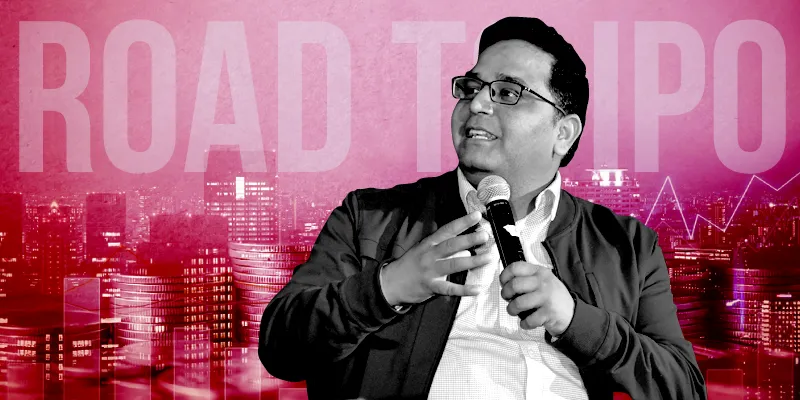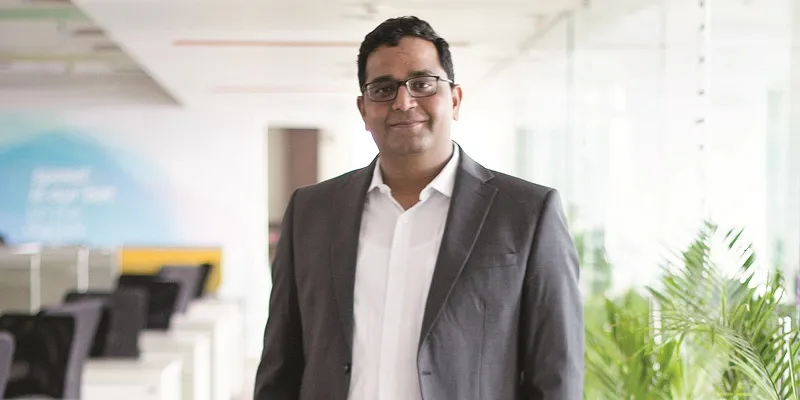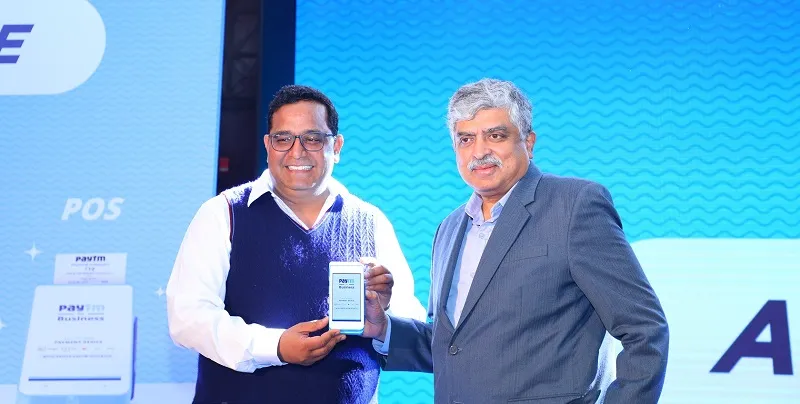[Interview] Paytm Founder Vijay Shekhar Sharma reveals road to profitability, IPO for digital payments major
Paytm chief Vijay Shekhar Sharma tells YourStory the advantage of having different organisations under one umbrella, why he’s happy being No 2 in some categories, and why it’s important to reach profitability before going for an IPO.

Noida-based payments major had an astonishing rise after India’s infamous demonetisation in 2016, and claimed market leadership.
But four years down the line, the market is different. Unified Payments Interface (UPI) is eating into the transaction pie of digital wallets, and it’s clear that payments will continue to exist as a zero-fee business in the country.
Having embraced both digital wallets and UPI, Paytm is now setting its sights on filing India’s first technology payments IPO and eyeing financial services as its next major frontier for growth. Looking at the market now with a new perspective, Paytm's plan is simple: monetising the existing customer base while achieving profitability.
And, despite the competition from the world’s largest technology behemoth, Google, and India’s biggest telecommunication disruptor, Jio, Paytm continues to be optimistic about achieving profitability in the next 18-24 months.
In an exclusive interview with YourStory, Paytm chief Vijay Shekhar Sharma talks about future plans and how Paytm plans to transform itself into a profitable financial services behemoth.
Edited excerpts of the interview:
YourStory (YS): The last time we spoke you believed that the real test for any company was free cash flows. Now, after the whole WeWork debacle, how do you read the situation?
Vijay Shekhar Sharma (VSS): So, what I meant is that profitability is overrated; free cash flow is the reality.
And it is perpetually true, and will be the real benchmark of any business, young, old, or mature. This means that companies in India who are spending money to grow market share should be conscious and cognisant about the kind of customer base they are attracting.
We remain committed to 500 million customers, but that does not mean every payment company or every single company needs to weigh in for that.
YS: Where does Paytm stand on the profitability metric, especially when there are plans to go for an IPO?
VSS: Paytm’s growth is divided into three segments. The first three years were all about finding the right product-market fit; the next three were about revenue and monetisation. The last phase will be about profitability and free cash flows.
We are in the second phase of that journey. In 2015, we started deploying QR codes and by 2018-19 completed our product-market fit. Now, 2019-20 onwards, we are monetising.
In the last 12 months, thanks to monetisation, and not reckless cost-cutting, we have been able to see our EBITDA losses reduce by 50 percent year on year. Our losses in January 2020 have halved as compared to 2019.
So, the product-market fit has been sorted out, and the next two years will be about monetisation and expansion.

Vijay Shekhar Sharma, Founder of One97 Communications
YS: Over the last two years, the company has launched multiple verticals, including Paytm FirstGames and Paytm Money. Which among these will generate significant revenue for Paytm?
VSS: Independently, all these companies in their own way are profitable or EBIDTA-contributing, and enjoy billion-dollar valuation.
So, while Paytm is creating these independent organisations, the fact that they are part of a bigger family gets them a lot of advantages, helping them expand and grow further.
But these companies continue to follow the same three-three-three model of product-market fit, monetisation, and profitability. Some are EBIDTA-positive margin businesses; some are neutral, breakeven.
These companies, Entertainment, Travel, Money, FirstGames, are at different phases of maturity. And I feel we have done a damn good job at attracting customers and merchants. Our cloud business (for merchants) and commerce platforms are EBITDA-positive and we are now incubating Financial Services.
YS: So, when can we expect One97 Communications to hit profitability?
VSS: Our EBITDA losses have reduced to half, and we can expect to be profitable over the runway of the next 18-24 months.
YS: These newer verticals still have room to grow. And considering your commitment towards building them, how does it affect Paytm’s profitability runway?
VSS: The advantage of having different organisations under one umbrella is that our Customer Acquisition Cost (CAC) costs are shared.
Our biggest costs in the systems are CAC, Payment, and Technology platforms. Having a common repeat helps us in saving on these costs.
When you look at competing businesses, let's say you look at the travel business… had more losses than our travel business.
Hence, Paytm is alright being number two (in some categories) as long as it makes money, as opposed to trying to pick up a vanity number one position.
Being number one for us is important in the core moat aspect. In our case, it means that it is about innovating more on the payment aspect and dominating that market share.
But in other categories, we are happy making more money than worrying about market share.
From March to December last year, we reduced our costs by 11 percent, increased GMV by 50 percent, and grew revenues by almost 23 percent.
YS: Paytm has had much success in the Japanese market with PayPay. Will you continue with international expansion, given that India is such a large market?
VSS: Our primary market will always be India. The incremental growth of India’s economy is so huge that it is important for us to be a dominating player in India.
We have entered international markets not because we want to find new revenue buckets, but because we are here to build a global company. So that means that once our product-market fit is sorted, we take it to international geographies.
YS: Will the commerce verticals of Entertainment and Travel go international?
VSS: After Payments as a core business goes international, our affiliates like Travel and Entertainment will also go international. So will our Payments Bank and Wealth division.
But, we will always be primarily an Indian-revenue company, and profits from international geographies will be invested in India.
Our international revenues may be bigger after five years or so, but not in the next two to three years.

Paytm chief Vijay Shekhar Sharma with Nandan Nilekani at the Paytm 'All-in-One' Android POS launch on Tuesday in Bengaluru.
YS: Paytm was always ahead of competition. As a wallet major, you said banks are the competition but now, with a profitable bank, who are your competitors?
VSS: We went from Payment to Commerce, and then to Financial Services.
At present, we are in incubation mode for our Lending, Insurance, and Wealth businesses. So that is what we are building.
Our 2020 mission is Financial Services, and Paytm looks to build a large moat on that. That will give us the leap of monetisation to will help us break even.
This data of wealth and bank accounts will even help us extend credit, maybe in the form of a credit card.
YS: What are the plans on Financial Services?
VSS: We divide our Financial Services business into three parts - Wealth, Lending, and Insurance. All of these require licences. We are in the last phase of procuring our insurance brokerage licence.
YS: What will be some of the key milestones for One97 to achieve before a proposed IPO?
VSS: The first and foremost absolutely will be profitability and whether we can predict these profits over the next quarters.
Until we are at the stage of predicting these quarterly profits, which is very far ahead, we will not go for an IPO.
YS: How does Paytm interpret Reliance’s entry into the Payments and Financial Services space?
VSS: Maybe not every business is a winner-take-all business. Companies have to decide on how many customers they want and serve them profitably.
Paytm has an aspiration of half a billion Indians on the platform. But, will we be able to convert half a billion Indians and turn them into a profit pool? Maybe not, because not every customer on your platform can be a profit pool.
That leaves a large percentage out there with no lock-in promise from customers for even the largest of companies. If there is a new player coming, it still becomes an overall play and means an increased number of players.
When we added new Mutual Fund customers, we added them for more AMCs and RIAs (Registered Investment Advisor) to serve them.
YS: You just closed $1 billion as part of a recent fundraise. Do you think that will suffice till the proposed IPO, or will you need to raise an additional round?
VSS: Based on current spend rates, we have not less than five years of capital runway money in the bank.
Do we need more money? I don't think so. Well, a runway for four-five years in the bank is a good state, and by that time we will be turning in profits.
(Edited by Teja Lele Desai)


![[Interview] Paytm Founder Vijay Shekhar Sharma reveals road to profitability, IPO for digital payments major](https://images.yourstory.com/cs/2/bd251c602d6a11e9aa979329348d4c3e/Road-to-IPO-1580883905688.png?mode=crop&crop=faces&ar=2%3A1&format=auto&w=1920&q=75)
![[YS Exclusive] Profitability is over-rated, companies are only as powerful as their free cash flow, says Vijay Shekhar Sharma](https://images.yourstory.com/cs/wordpress/2018/03/VSS.gif?fm=png&auto=format&h=100&w=100&crop=entropy&fit=crop)






